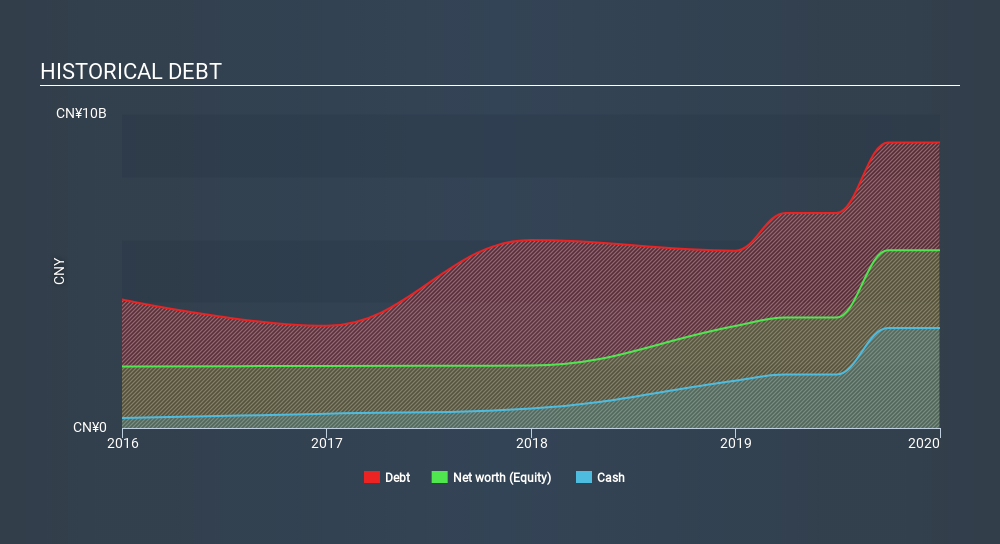- Hong Kong
- /
- Real Estate
- /
- SEHK:6111
DaFa Properties Group (HKG:6111) Seems To Be Using An Awful Lot Of Debt

David Iben put it well when he said, 'Volatility is not a risk we care about. What we care about is avoiding the permanent loss of capital. So it seems the smart money knows that debt - which is usually involved in bankruptcies - is a very important factor, when you assess how risky a company is. We can see that DaFa Properties Group Limited (HKG:6111) does use debt in its business. But is this debt a concern to shareholders?
When Is Debt Dangerous?
Debt assists a business until the business has trouble paying it off, either with new capital or with free cash flow. Ultimately, if the company can't fulfill its legal obligations to repay debt, shareholders could walk away with nothing. While that is not too common, we often do see indebted companies permanently diluting shareholders because lenders force them to raise capital at a distressed price. By replacing dilution, though, debt can be an extremely good tool for businesses that need capital to invest in growth at high rates of return. When we think about a company's use of debt, we first look at cash and debt together.
See our latest analysis for DaFa Properties Group
What Is DaFa Properties Group's Net Debt?
As you can see below, at the end of December 2019, DaFa Properties Group had CN¥9.09b of debt, up from CN¥5.65b a year ago. Click the image for more detail. However, it also had CN¥3.18b in cash, and so its net debt is CN¥5.91b.

A Look At DaFa Properties Group's Liabilities
We can see from the most recent balance sheet that DaFa Properties Group had liabilities of CN¥15.9b falling due within a year, and liabilities of CN¥6.19b due beyond that. On the other hand, it had cash of CN¥3.18b and CN¥3.57b worth of receivables due within a year. So its liabilities total CN¥15.3b more than the combination of its cash and short-term receivables.
This deficit casts a shadow over the CN¥3.10b company, like a colossus towering over mere mortals. So we definitely think shareholders need to watch this one closely. After all, DaFa Properties Group would likely require a major re-capitalisation if it had to pay its creditors today.
In order to size up a company's debt relative to its earnings, we calculate its net debt divided by its earnings before interest, tax, depreciation, and amortization (EBITDA) and its earnings before interest and tax (EBIT) divided by its interest expense (its interest cover). Thus we consider debt relative to earnings both with and without depreciation and amortization expenses.
DaFa Properties Group has a rather high debt to EBITDA ratio of 5.6 which suggests a meaningful debt load. But the good news is that it boasts fairly comforting interest cover of 4.6 times, suggesting it can responsibly service its obligations. Notably DaFa Properties Group's EBIT was pretty flat over the last year. Ideally it can diminish its debt load by kick-starting earnings growth. The balance sheet is clearly the area to focus on when you are analysing debt. But it is future earnings, more than anything, that will determine DaFa Properties Group's ability to maintain a healthy balance sheet going forward. So if you're focused on the future you can check out this free report showing analyst profit forecasts.
Finally, a company can only pay off debt with cold hard cash, not accounting profits. So it's worth checking how much of that EBIT is backed by free cash flow. Over the last three years, DaFa Properties Group saw substantial negative free cash flow, in total. While investors are no doubt expecting a reversal of that situation in due course, it clearly does mean its use of debt is more risky.
Our View
To be frank both DaFa Properties Group's conversion of EBIT to free cash flow and its track record of staying on top of its total liabilities make us rather uncomfortable with its debt levels. But at least its EBIT growth rate is not so bad. After considering the datapoints discussed, we think DaFa Properties Group has too much debt. That sort of riskiness is ok for some, but it certainly doesn't float our boat. When analysing debt levels, the balance sheet is the obvious place to start. However, not all investment risk resides within the balance sheet - far from it. Take risks, for example - DaFa Properties Group has 2 warning signs (and 1 which is concerning) we think you should know about.
Of course, if you're the type of investor who prefers buying stocks without the burden of debt, then don't hesitate to discover our exclusive list of net cash growth stocks, today.
Love or hate this article? Concerned about the content? Get in touch with us directly. Alternatively, email editorial-team@simplywallst.com.
This article by Simply Wall St is general in nature. It does not constitute a recommendation to buy or sell any stock, and does not take account of your objectives, or your financial situation. We aim to bring you long-term focused analysis driven by fundamental data. Note that our analysis may not factor in the latest price-sensitive company announcements or qualitative material. Simply Wall St has no position in any stocks mentioned. Thank you for reading.
About SEHK:6111
DaFa Properties Group
DaFa Properties Group Limited, an investment holding company, operates as a real estate developer in the People’s Republic of China.
High growth potential and good value.
Market Insights
Community Narratives





